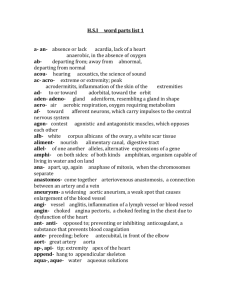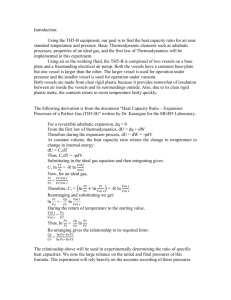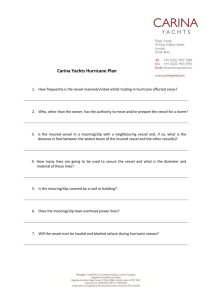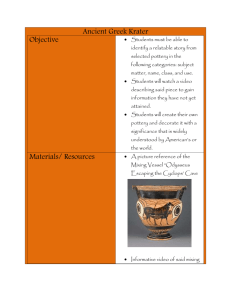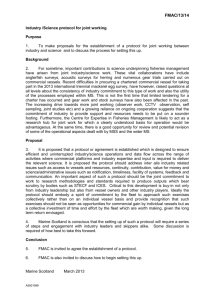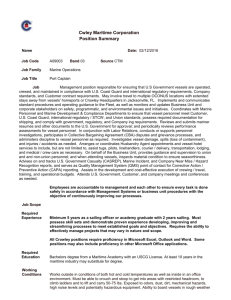hurricane preparedness plan
advertisement
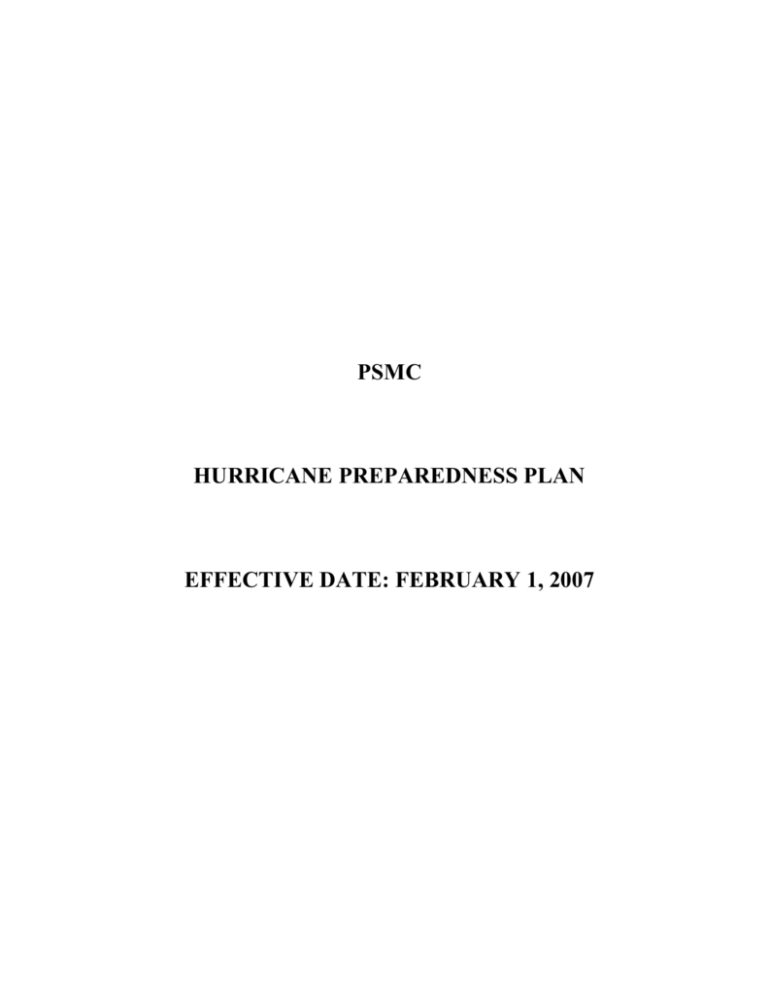
PSMC HURRICANE PREPAREDNESS PLAN EFFECTIVE DATE: FEBRUARY 1, 2007 Page 1. HURRICANE SEASON PREPARATION (MARINA STAFF) CUSTOMER CONTACT: Ensure that all customer emergency contact information is up to date and entered into PSMC database and placed in Customer File; collect e-mail contact information if available. GENERATORS: Check all generators for proper operation (change oil, test batteries, start & run, run under load, ensure plug-in receptacles in good working order. EMPLOYEE CONTACT: Update Employee Contact List; ensure all staff have copy & understand procedures for calling in/reporting to work post-hurricane. FACILITY INSPECTION: General manager conducts complete facility inspection no less than weekly to ensure piers and docks are free from clutter; initiates and directs the removal of all excess gear and equipment from docks. HURRICANE PLAN: Print & distribute to all staff at all facilities; ensure that all staff is familiar with plan and facility preparation/response procedures and location of equipment and supplies. SUPPLIES: Ensure adequate supplies of tools, equipment, etc. to deal with preparation and recovery are on-hand at each facility (dock lines, batteries/radios, gas/diesel, rain gear, bottled water). WORK VESSELS: All marina work vessels in good working order; dock lines and safety eqpt. on-board; fuel topped off; bilge pumps operational; generator operational. Ensure staff understands evacuation plan & individual responsibilities. VEHICLES: All PSMC vehicles (including forklifts, tractors, lift, gator) in good working order; fuel maintained topped off; staff at each facility understands procedures for relocating/securing rolling stock to safe area inside Vectra building. Page 2. I. GENERAL A. Objective: To provide clear and concise procedures for PSMC staff and vessel owners to follow in the event of a Hurricane or severe storm. To manage, maintain security, and control the operation of PSMC facilities during an announced emergency situation. B. Background: Marinas are not safe locations for vessels during a Hurricane or Tropical Storm – their proximity to the water and coastal regions generally place these facilities either close to or directly in the path of these storms. PSMC does mandate evacuation; it is highly recommended that vessels be relocated well in advance to safer locations in order to protect both the vessel and the Marina. The following procedures will enhance PSMC’s ability to protect the lives and property of our marina customers, and safeguard our facilities. C. Preparation: Every vessel owner should have an individual Hurricane Plan, designed specifically for their vessel. This Plan should include the location of alternate berthing / storage for their vessel; a checklist of key procedures to be followed to ready the vessel for a storm; necessary gear and supplies on board to help secure the vessel on short notice; and the name and phone number of a friend or family member who will act on behalf of the vessel owner should they be out of town or unable to reach the vessel. Marina customers should regularly provide their facilities with current contact information, including emergency telephone numbers. Vessel insurance is a mandatory requirement for berthing / storing a vessel at a PSMC– customers should make sure that their vessel insurance is current and that coverages are sufficient protection for vessel liability, damage, or loss. PSMC shall designate an Operating Post (“O.P.”), which shall generally be the facility’s Marina Office (unless otherwise designated) for the coordination of operations, communication, and emergency response. The O.P. shall be in communication with the Escambia County Emergency Operations Center (E.O.C.); PSMC staff shall be familiar with the emergency procedures. Page 3. II. PSMC ACTION PLAN A. Hurricane Watch 1.) All PSMC personnel are required to know by definition the status of a weather emergency as differentiated between a Hurricane Advisory, Watch, Warning, etc. 2.) All PSMC personnel will be prepared to respond when called upon to report to work. Proper planning will ensure that personal needs are met, while still meeting the need to respond to an emergency situation at our facility. 3.) At designated staging areas all emergency equipment and supplies (i.e. pumps, generators, vehicles, etc.) are to be at full operational capacity and ready to move. Batteries are fully charged; life jackets, rings, lines, and other safety equipment stocked and in full working order. 4.) At the O.P. the information cycle is started – the GM and the O.P. shall contact the E.O.C., and verify contact information. a.) To Marina Patrons – directly, by voice announcement, by posted notice, by phone, by passing the word the proposed order of an evacuation plan will be announced. b.) Vessel owners / operators are instructed to monitor VHF Channel 16, the Marine working channel, and weather station for information updates and emergency instructions. c.) All trash and debris are removed from containers to prepare those containers for receiving additional trash. Parking Lots, common areas, and docks are checked for removal of unnecessary equipment and materials. d.) PSMC staff shall ascertain that vessel owners are prepared for an emergency evacuation. e.) Calls are made upon Marina customers to serve as volunteer help, if needed. f.) Notification is made to other personnel/Contractors if there is need to relocate any vehicles, equipment, or property. PSMC’s employees are designated at the facility to handle the safeguarding, evacuation, or relocation of the above, as well as files and irreplaceable data. 5.) Commence securing buildings, docks, vessels, and upland property. Only basic facility accesses are left open. Page 4. 6.) PSMC wet slips are to be kept open for a smooth flow of vessels from their slips and any additional haul out vessels to the upland. Direct trailerable vessels out of the area. 7.) Report essential information to GM. Receive instruction communications, controls, phone numbers, radio channels, etc. as to 8.) Rotate facility staff home to address personal needs. All PSMC personnel will be required to report back to work, scheduled in selected groups at selected locations, for continuing emergency operations. It is mandatory that all PSMC personnel report to work as instructed. B. Hurricane Warning 1.) All Marina personnel on duty shall alert the boating public of any Hurricane Advisory Update and Warning information. 2.) All off-duty PSMC personnel must respond immediately and report to work. Personal needs should now have been met and all available personnel will be meeting the need for necessary emergency work at the facility. 3.) Emergency equipment and supplies are positioned to be mobilized for fast use. Piers and bulkheads are cleared of movable objects, garbage, and debris. Loose items that cannot be removed are secured, tied down, etc. 4.) Keep vessel and PSMC customer traffic flowing in a smooth and orderly fashion – be prepared to assist vessel owners with untying lines, securing equipment, etc. 5.) Complete securing buildings, piers, and docks; finish safeguarding property from flood areas; secure areas once completed. C. Facility Evacuation 1.) Upon local directive, facilities are secured and evacuated. Vessel owners have been directed to Hurricane Shelters. PSMC personnel are dismissed, with instruction to establish contact with the GM as soon as possible after the storm for instruction. PSMC will be shut down for the duration of the emergency. Begin planning for “after the storm” action. Page 5. III. VESSEL OWNER ACTION PLAN – A. Precautionary Measures (Should be initiated at beginning of each Hurricane Season, and on an ongoing basis) 1.) Have your vessel Hurricane Plan established. Know in advance where you are going to, what you are going to do, and when you are going to do it. 2.) Involve a friend or family member(s) in your vessel Hurricane Plan so that they may assist you if you are out of town or unable to get to your vessel in the event of an approaching storm. Initiate a “dry run” to ensure that you are ready for the real thing. 3.) Make sure that your vessel’s operating systems are in good working order. Replace fuel filters, inspect batteries/charging system, and keep fuel tanks topped off. Inspect all bilge pumps/connections. Inspect fire-fighting equipment for readiness. 4.) Inspect all working and spare dock lines and ground tackle (check chain and shackles). Ensure that all extra line is in good condition and in an accessible location. Have sufficient chafing gear for all working lines (neoprene hose works well). 5.) Devote some time to practice tying your vessel as you would for a Hurricane or severe storm. Make sure that your extra line is of sufficient quantity and strength. B. Active Measures (To be initiated at least 72 hours before Hurricane expected landfall) 1.) All vessels should be evacuated from the Marina at this time. 2.) If relocating your vessel from the Marina, do it now and do it early. The longer you wait, the more difficult it will be getting to where you are going. Vessels remaining in the Marina, that require relocation to other slips (for purposes of vessel safety and cleat/piling stress reduction) will be moved at this time. 3.) Strip as much as you can from the vessel topsides. Bimini tops, dinghies, motors, sails, roller furling, outriggers, chairs, should be stowed. 4.) Make sure that the vessel bilge is free from sludge, debris and obstruction so that rainwater can freely exit your boat. Page 6. 5.) Enhance watertight integrity above and below the waterline – seal windows, doors, hatches (duct tape will work). Shut seacocks, cap off or plug unvalved through-hull fittings such as sink drains. Clear cockpit drains. 6.) Hoses, bicycles, and everything else off piers and docks. Dock boxes emptied. Commercial vessels: anything left on the piers will be removed and thrown out. 7.) PSMC will shut down operations to the public upon the issuance of a Hurricane Warning or 24 hours prior to expected landfall (whichever comes first). At this time vessels requiring special berthing arrangements within the Marina will have to be moved. All vessel owners should be off their vessels at this time. If a significant storm surge is expected, electrical service and water to the piers will be shut down.


